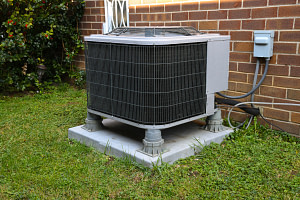Heat pumps use technology that’s similar to what’s found in air conditioners and refrigerators. They extract heat from many sources, like the surrounding air, sun-warmed soil, nearby sources of water that store geothermal energy, or other wasted heat from the environment. Heat pumps then amplify and transfer heat to where it’s wanted. Since most of the heat is transferred from outside to inside rather than generated by the heat pump itself, heat pumps are far more efficient and environmentally friendly than conventional means of heating buildings such as coal or gas boilers.
The energy that a heat pump creates is typically multiple times more than what is required to power the heat pump itself. The pumps operate off of electricity, making them useful for solar installations for those who are particularly interested in energy independence and going green. The typical heat pump will output four times more of its electrical energy equivalent in heat than what it takes to run. As heat pump models only become more and more advanced, this will only increase inefficiency as well. Heat pumps can even be combined with other heating systems into hybrid configurations in the case that such unique setups are required or to ease the transition to exclusive heat pump use.
Heat pumps can be connected to tanks in order to produce sanitary hot water and deliver additional flexibility for hydronic systems. In commercial sectors, heat pumps can be used to deliver hot water, steam, or air to directly heat various materials. Large-scale heat pumps are common for industrial applications and generate higher temperatures than their residential counterparts. Industrial heat pumps save companies money by making use of waste heat from other industrial processes.
What are the Parts of a Heat Pump?
A heat pump consists of a compressor that’s used to move a refrigerant through a refrigeration cycle as well as a heat exchanger that extracts the heat from the surrounding outdoor or industrial areas. This heat is then moved to a heat sink through a different heat exchanger. From the perspective indoors, heat is delivered using either a hydronic or forced-air system such as underfloor heating or radiators.
How Does a Heat Pump Work in Summer?
In warmer months, heat pump systems work just like typical air conditioners would. Heat pumps will use a refrigerant to absorb heat from inside your home or business and transfer it to the air outside. This is an outstanding way to cool a space quickly that’s also economically savvy and environmentally friendly. Since heat pumps primarily move energy rather than create it, you can expect savings on your electric bill of around 75% or greater when cooling your home with a heat pump in the summer.
How Does a Heat Pump Work in Winter?
People who only have a slight awareness of how heat pumps operate might think that they don’t perform well in cold weather. However, this is far from the truth. Heat pumps can be used all winter long since they’re still able to pull heat in from the air around your home or business. Believe it or not, winter air still holds plenty of heat for an air pump refrigerant to make use of, and it does so with style. A reversing valve changes the direction of the refrigerant flow in your heat pump system depending on how you set your thermostat.
Have More Heat Pump Questions?
Magnolia Heating and Cooling has the answers you’re looking for. Our professional heat pump installers nearby have set up thousands of homes and businesses with heat pumps to help regulate temperatures in any climate. If you’re looking to learn more about how heat pumps work in various temperatures or want to make the switch to economically-friendly heating and cooling, give us a call or send us an email today!


